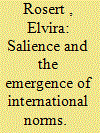| Srl | Item |
| 1 |
ID:
164437


|
|
|
|
|
| Summary/Abstract |
This article theorises salience – defined as the amount of attention granted to an issue – as an explanatory factor for the emergence and non-emergence of norms, and shows how salience affects existing explanations such as issue adoption by norm entrepreneurs, mobilisation, social pressure, and framing. The relevance of salience is demonstrated by exploring the question of why the norm against incendiary weapons was adopted in the Convention on Certain Conventional Weapons (CCW) in 1980, and why the norm against cluster munitions was not, even though both weapons were deemed particularly inhumane and thus, put on the agenda when the CCW negotiations started in 1978. Drawing on secondary sources and on original data from public and institutional discourses, I study the influence of salience on the emergence of the anti-napalm norm and the non-emergence of the anti-cluster munitions norm in the period of 1945–80. The results demonstrate that and how the discrepancy in salience of the napalm and the cluster munitions issues mattered for the outcomes of the two norm-setting processes.
|
|
|
|
|
|
|
|
|
|
|
|
|
|
|
|
| 2 |
ID:
160881


|
|
|
|
|
| Summary/Abstract |
The article examines the roles of NGOs in banning cluster munitions that resulted in the 2008 Convention on Cluster Munitions and the campaign against landmines in the 1990s. It argues that NGOs have managed to move questions about the use of force from the closed decision-making sphere of military commanders and arms control diplomats into open public debate. Thus NGOs have simultaneously desecuritised the use of force by states, securitised certain weapons technologies, and made human beings the referent object of security. This has marked a shift from state security and strategic disarmament to human security and humanitarian disarmament, without fundamentally challenging the laws of war. However, in contrast to realist views that only militarily useless weapons ever get banned and radical critical perspectives that see new legal regimes as legitimating war and US hegemony, I argue that NGOs have engaged in immanent critique of military arguments and practices based on prevailing principles of international humanitarian law. The resulting weapon ban treaties have both restrained US policy and undermined its legitimacy. The article explores the discursive choices that underpinned the remaking of the security agenda by NGOs and their role as de/securitising actors and emancipatory agents of change.
|
|
|
|
|
|
|
|
|
|
|
|
|
|
|
|